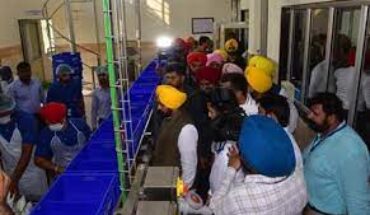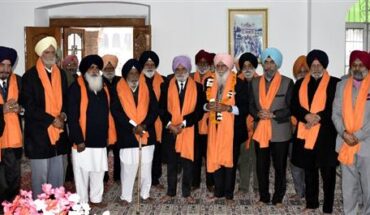Chandigarh; 90.2% teachers said that they are taking online classes for the first time,without previous experience of online teaching while 9.8% teachers mentioned that they were not taking online classes during lockdown amid COVID-19.
This was revealed during an online survey comprising a total sample size of 3550 teachers from different Government, Recognized Private and Government Aided Private Schools of U.T Chandigarh and Punjab. The sample survey consisted of 38.6% were Primary Teachers (PTs), 33.9% Trained Graduate Teachers (TGTs) and 27.5% Post Graduate Teachers (PGTs).
The online survey was conducted by Internal Quality Assurance Cell (IQAC) of Dev Samaj College of Education, Chandigarh to study the challenges faced by teachers during online teaching besides seeking their inputs/recommendations to further improve it in a result oriented manner. The survey was carried out by Dr. Anita Nangia and Dr. Seema Sareen under the guidance of Principal, Dev Samaj College of Education Dr. Agnese Dhillon.
The responses entered by teachers during the online survey throw ample light on various challenges frequently faced by them since the online teaching came into light. The findings of the survey pointed out that 33.56% of the teachers do not face the problem of lack of appropriate materials and resources while 61.66% reported that they faced this challenge to some extent while 7.77% to great extent. Only 17.30% of the teachers did not face any technical problems while the majority of the group faced this challenge to some extent (64.62%) and 18.08% to a great extent.
Similarly, lack of internet facilities to students is not a problem for only 17.27% teachers while for rest of 82.73%, it is a problem to some extent (61.49%) or to great extent (21.24%). Lack of in-service training is not a challenge for 44.23% of the group while the rest of the group perceive it as a challenge in online teaching. 64.68% reported lack of cooperation from parents as a challenge. 74% teachers find it difficult to assemble all the students for the class to some extent (50.96%) as well as to a great extent (23.04%) while the rest of 26% do not face this challenge.
It was also found that 22.54% of the teachers did not find it difficult to follow up the learning of students while 56.45% had this problem to some extent and 21.01% to a great extent. However, lack of time (63.89%) and lack of confidence (85.75%) was not at all a problem for the majority of teachers.
The Study has further revealed that the majority of the teachers (32.75%) use WhatApp . They use this App to send notes to the students in pdf formats and many teachers make their own videos of the lessons and share these videos with the students. This was followed by Cloud Meet apps like Zoom, Web Ex and Team Link (31.94%) to take online classes of the students. 16.08% of the teachers use Google Apps like Google Classrooms, Google Hangouts and Google Meets for online teaching. While 19.20% of the group use other apps like Next Learning Platform, SnapHW, Shisya, Deeksha, Extramarks and give YouTube links to the students.
Notably, the survey was conducted during the trying circumstances amid the coronavirus pandemic when the schools and colleges across India have been shut since mid-March. After a few days, an unplanned and rapid move to online teaching and learning with no training to teachers, insufficient bandwidth and little preparation got initiated by all educational institutions. Online mode of teaching, undoubtedly, is a good stopgap arrangement with no other option. But, approximately two-third students in rural areas are unable to access teaching material as they don’t have internet access. The least benefited children of this online mode of teaching are poor students from rural areas; and those who took admissions in EWS quota in reputed private schools.
The teachers doing online teaching appreciated this shift from traditional classroom teaching to online mode as many of them mentioned “During this pandemic Online Class is one of the best ways to keep the students in touch with their studies.” Another teacher said, “I strongly promote online teaching in this technology based world. It’s a great initiative taken by our school.” Likewise, one more teacher added, “To fight with this pandemic. Online teaching emerged as a blessing … we should continue with this to ensure the safety of our children. We should take care of student safety first and online classes are also imparting good knowledge to kids. Initially the process is difficult but regular inputs can make it more effective with time.”
Teaching online automatically makes you less visible than you’d be in a traditional teaching role. This can impact your authority, and make students feel less connected with you. Some teachers added that many of the students didn’t “have the kind of devices, laptops, smartphones… or money to keep the connection going”. Moreover no place for practical work in the subjects like Physics, Chemistry and Biology etc. and psychological, social, emotional, and physical aspects of development are totally neglected and above all parents cooperation needs to be strengthened. “These are real challenges that hinder the process of online learning,” the respondent teachers said.
Some school teachers complained that they were themselves struggling to get a hang of the technology and wanted they should be given proper training. Similarly, students too need training for how to attend online classes. Efficient Wi-fi and power systems are also required to make this system far more result oriented and efficient.
More user friendly and effective Apps should be developed to cope up with the aforesaid problems. The training to teachers in managing technology and counselling of parents regarding the benefits and challenges of online teaching is the need of the hour. Students and parents and even some teachers feel that this is a waste of time as everything would be repeated once the schools open, so there should be proper enlightenment for all of them that whether online or offline teaching both are equally important and that the pace of the curriculum would adversely affect the students’ development and future and the education system of the country can consequently suffer. Therefore, we should be serious and come up with many innovative techniques and activities so that interest and motivation among students to study can be developed. Their mental, emotional and psychological health must be taken care of.
CBSE should provide some uniform pattern of study material for all teachers. Government policy should give free high speed internet for educational Apps or softwares. As one teacher reported “all the students don’t have resources to take online classes some have latest smartphone issues due to financial problems; some have network issues; and some have seriousness issues. What is in the teacher’s hand, only he or she can deliver a lecture. The teachers can’t provide for their resources.
On the other hand, in traditional classroom teaching students have some fear of teachers (in terms of request). Face to face interaction and students maintain discipline. They can’t leave the classroom while the teacher is teaching. Overall online teaching can’t replace offline teaching in any sense. Only those students who have resources (Smartphone or laptops) good internet connectivity and are serious about study get benefitted by online.” Few more educational TV channels can be incorporated that would cover some topics for kids.
A Punjabi teacher and a Hindi teacher stated that “we find it difficult due to unavailability of the Punjabi font and less material in Hindi”. Teachers are really putting their heart to the teaching process…. I expect students to be a little more serious towards this online teaching learning process. We have to find some more appropriate ways by which we can evaluate students’ work or efforts. i.e. follow up should incorporate the process very strongly. Parents should supervise their children so that there is no misuse of technology during this difficult phase. Student surveys should also be conducted to understand the availability of resources and the internet.
While underscoring the need of physical activity, a teacher said, “Physical education can be taught through traditional teaching only as it not so convenient to teach students physical activity, sports etc through online teaching…because there is lack of equipment, space etc. in the houses and the results we get through traditional teaching cannot be achieved through online teaching.”
In this way, the pandemic COVID-19, the study concludes, has increased awareness and use of digital technology in education, a major objective of the national education policy that has remained elusive so far






